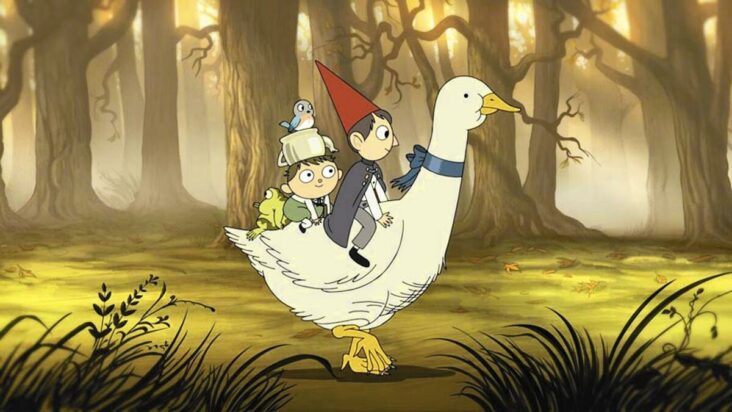
The Loveliest Lies of All

This column is a reprint from Unwinnable Monthly #180. If you like what you see, grab the magazine for less than ten dollars, or subscribe and get all future magazines for half price.
———
Peripatetic. Orientation. Discourse.
———
“I think now that the suburbs were a kind of tranquilizer for the generation before us, if topography can be a drug.” – Rebecca Solnit, A Field Guide to Getting Lost
Not what, but where is over the garden wall? In the west, in the past. Itself a fairytale of culture moving and evolving, from Europe to the new world. America forming, the many lost along the way, their names and roles costumes like the place names of an old world transported upon the new. The land “conquered, but not discovered.”
Over the Garden Wall is about ultimately returning to the garden – the kids back home to their suburb, Beatrice to her family, the huntsmen to his cottage, the rock to Mrs. Daniel’s yard. Each disjoint a point in time that suggests there is somewhere that all these somewhens mingle. It’s Americana.
Folklorist Kristiana Willsey argues that Over the Garden Wall returns American fairy tales to a place of ambiguity missing in its contemporary landscape of stories like Shrek and Hoodwinked. “[Patrick] McHale’s miniseries purifies fairy tale motifs of a century of popular associations and recontextualizes them within a world of earlier, more obscure references.” McHale draws on Americana, New England postcards and the country’s history of animation stretching back to its vaudeville origins.
To be clear, I do not accuse McHale of retreading the racial stereotypes of the iconography and form. It’s appropriate, necessary even, to tell a story about America. Rather, we must reckon with the many exclusions of our past and present.

Writing on the blues, Rebecca Solnit would consider the role of place in the genre so closely associated with Reconstruction and the southeast. The blues were songs for a people who could not return, the “perpetual internal exile” of Blacks moving north as the land they lived and worked on could not be theirs. The blues voiced longing and grief when “even nostalgia and homesickness [were] privileges not granted to everyone.”
I’ve learned growing up in the 21st century how art responded to the horrors of the world wars and the imperialism and genocide on display in the 20th century. Such a radical shift is gloaming again as the old signs lose their meaning. Monikers for good and evil – civilian, child, refugee, crime, border, bomb, war, genocide – have all lost their significance. The horrors are felt only by the oppressed and the empathetic who watch bodies burn and bleed, while those buoyed by empire dissociate from the realities of the world around them, art that speaks to this moment unable to reach them.
The old stories of light and dark can no longer suffice when these signs have lost their relevance.
Over the Garden Wall does not attempt to sway its viewer with horror. Its stakes are remarkably small, its problems ultimately philosophic (of the existential variety appropriate for Wirt’s pubescence). But it does not take us to Europe’s castles and cottages on a summer vacation during the genocide. It takes us all to the home we cannot claim, that of the American rural past. To the frontier fantasy I can lay no claim to – only inheritance.
———
Autumn Wright is an essayist. They do criticism on games and other media. Find their latest writing at @TheAutumnWright.




